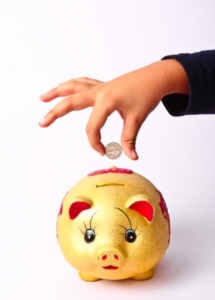
Children should start learning lessons about money as early as they began to recognize it. They should especially learn not to take it for granted and how to appreciate it. My children are young, but I can already see that they understand that when we go into a store we cannot just lift and take, we must pay and then leave.
Just yesterday, my 2 year old and I were at the store and she saw a book or toy she wanted and said, “Mom, we have to pay first.”
“Yes, I told her. It isn’t yours until we pay for it.” It is during these moments that financial lessons began. Here are my tips on how to help your child learn about money at an early age.
- Teach your child to save. I believe that one of the best baby shower gifts is a personalized piggy bank. Start saving money for your child when he or she first comes out of your womb. Provide chances for your child to put a percentage of their own money into the bank.
- As your child gets older, talk about monetary goals that they can develop and ways to achieve them (e.g, working, saving, investing, etc).
- Tell your child the monetary value of money. This can be one of their first practical math lessons. Talk to your child about how coins have values and “paper money” also has value. Show and tell them what they will be able to buy, with a little change or a lot dollar bills, so that they will have a better understanding of what the values mean. Play games where they pretend to buy things with money.
- Help children understand the difference between needs and wants. Paint a practical picture for them relevant to their age group so that they will be able to have a tangible understanding of money and our relationship to it. Give your child an opportunity to learn about the consequences as well as the benefits of money. For example, if your child wants to buy something, but cannot afford it, don’t just add the extra money. Instead, let your child wait a day or two and earn the extra money. The bigger picture that you want your child to learn is that if you cannot pay for something in its entirety, you should wait until you have enough money to buy what you want.
- The best way to teach your child about money is to have good money habits yourself. If you desire to learn more about money, take a personal finance class about it, read books about it, talk to people you trust and people that can provide good financial information.
- As your child gets older, take them to a bank and let them have access to their own account. Many banks have programs for children that will help teach healthy financial habits and will not hurt their future records if they make mistakes.
- Don’t overwhelm your child about money. Make it fun and teach them gradually. Toys like cash registered and piggy banks are great to show very young children that money has value.
